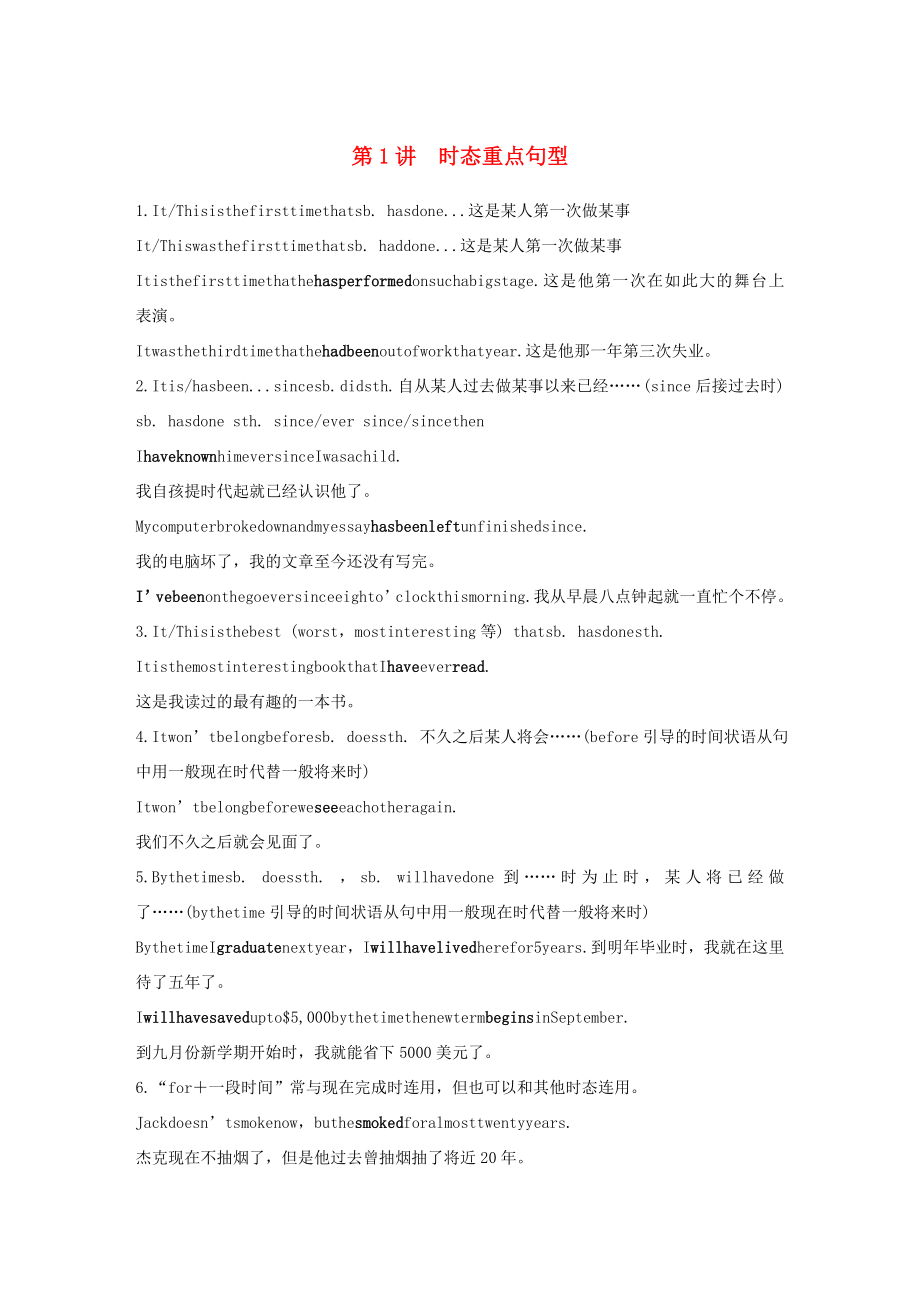《(江蘇專版)高考英語 考前保分訓練 專題1 語法知識 第5節(jié) 動詞的時態(tài)和語態(tài) 第1講 時態(tài)重點句型練習 牛津譯林版-牛津版高三全冊英語試題》由會員分享,可在線閱讀����,更多相關《(江蘇專版)高考英語 考前保分訓練 專題1 語法知識 第5節(jié) 動詞的時態(tài)和語態(tài) 第1講 時態(tài)重點句型練習 牛津譯林版-牛津版高三全冊英語試題(2頁珍藏版)》請在裝配圖網(wǎng)上搜索。
1�、第1講 時態(tài)重點句型
1.It/Thisisthefirsttimethatsb. hasdone...這是某人第一次做某事
It/Thiswasthefirsttimethatsb. haddone...這是某人第一次做某事
Itisthefirsttimethathehasperformedonsuchabigstage.這是他第一次在如此大的舞臺上表演。
Itwasthethirdtimethathehadbeenoutofworkthatyear.這是他那一年第三次失業(yè)����。
2.Itis/hasbeen...sincesb. didsth. 自從某人過去做某事以來已經(jīng)…… (s
2、ince后接過去時)
sb. hasdone sth. since/ever since/sincethen
IhaveknownhimeversinceIwasachild.
我自孩提時代起就已經(jīng)認識他了。
Mycomputerbrokedownandmyessayhasbeenleftunfinishedsince.
我的電腦壞了���,我的文章至今還沒有寫完���。
I’vebeenonthegoeversinceeighto’clockthismorning.我從早晨八點鐘起就一直忙個不停。
3.It/Thisisthebest (worst��,mostinteresting等) th
3����、atsb. hasdonesth.
ItisthemostinterestingbookthatIhaveeverread.
這是我讀過的最有趣的一本書。
4.Itwon’tbelongbeforesb. doessth. 不久之后某人將會……(before引導的時間狀語從句中用一般現(xiàn)在時代替一般將來時)
Itwon’tbelongbeforeweseeeachotheragain.
我們不久之后就會見面了�。
5.Bythetimesb. doessth. ,sb. willhavedone到……時為止時����,某人將已經(jīng)做了……(bythetime引導的時間狀語從句中用一般現(xiàn)在時代替
4、一般將來時)
BythetimeIgraduatenextyear���,Iwillhavelivedherefor5years.到明年畢業(yè)時����,我就在這里待了五年了��。
Iwillhavesavedupto$5,000bythetimethenewtermbeginsinSeptember.
到九月份新學期開始時,我就能省下5000美元了�����。
6.“for+一段時間”常與現(xiàn)在完成時連用�,但也可以和其他時態(tài)連用。
Jackdoesn’tsmokenow��,buthesmokedforalmosttwentyyears.
杰克現(xiàn)在不抽煙了�����,但是他過去曾抽煙抽了將近20年��。
—Haveyouhea
5����、rdabouttherecentelection?
—Sure���,ithasbeentheonlythingonthenewsforthelastthreedays.
——你聽說最近的選舉沒有���?
——當然,這是最近三天唯一的新聞事件�。
—Guesswhat?ImetMarkattheparty.
—Ifmymemoryservesmecorrectly,youtwohadn’tseeneachotherforalmosttenyears.
——你猜怎么著���?我在聚會上遇到了邁克�。
——如果我沒記錯的話��,你們倆差不多10年沒見面了����。
Heplayedfootballformanyye
6、arswhenhewasyoung.年輕的時候���,他踢了很多年足球�����。
—Peter����,wheredidyouguysgoforthesummervacation?
—Wehadbeenbusywithourworkformonths���,sowewenttothebeachtorelaxourselves.
——彼得����,你們暑假去哪里了?
——我們幾個月來一直忙于工作�,所以我們就去了海灘放松一下。
7.hardly/scarcely...when...�����,nosooner...than...句型結構中����,主句用過去完成時,從句用一般過去時���,意為“一……就……”�。
HardlyhadIgothom
7��、ewhentherainpoureddown.
我剛到家大雨就傾盆而下���。
8.bedoing...when...正在做……這時……
beabouttodo...when...正要做……此時……
hadjustdone...when...剛做了……這時……
beonthepointofdoing...when...正要做……這時……
Iwasthinkingaboutmynewplanwhenagoodideaoccurredtome.
我正在考慮我的新計劃,這時一個好主意浮現(xiàn)出來��。
Theywerejustabouttosetoutwhenitbegantorain.他們正要出發(fā)�����,這時下起雨來了。
Ihadjustlaindownwhenthetelephonerang.
我剛躺下��,這時電話鈴響了��。
Iwasonthepointofgivingupthesearchwhensomethingcaughtmyeyeinthebushes.
我正要放棄搜索時突然注意到灌木叢中有什么東西���。
 (江蘇專版)高考英語 考前保分訓練 專題1 語法知識 第5節(jié) 動詞的時態(tài)和語態(tài) 第1講 時態(tài)重點句型練習 牛津譯林版-牛津版高三全冊英語試題
(江蘇專版)高考英語 考前保分訓練 專題1 語法知識 第5節(jié) 動詞的時態(tài)和語態(tài) 第1講 時態(tài)重點句型練習 牛津譯林版-牛津版高三全冊英語試題

